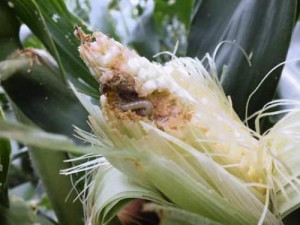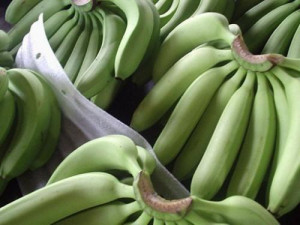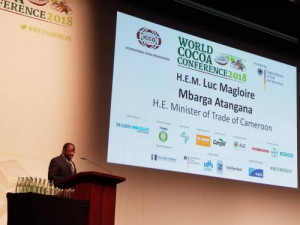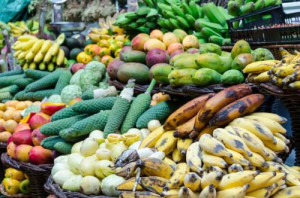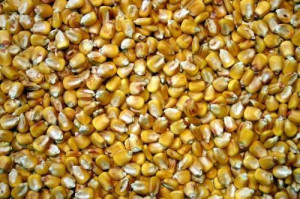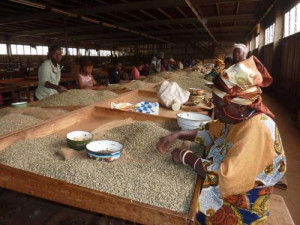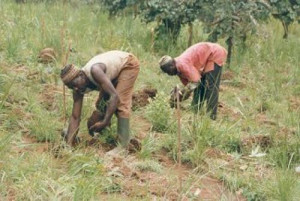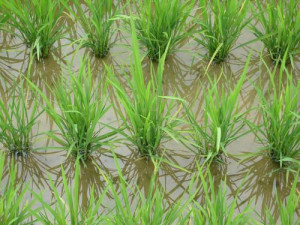
The WFP helps Cameroon fight fall Armyworm
Official sources reveal that the World Food Program has provided CFA150 million to help Cameroon fight the fall armyworm.
Let’s remind that early this year, Cameroon had certified two pesticides which would help combat that worm which is ravaging the cereal production in Cameroon and in many African countries.
According to experts of the ministry of agriculture, the armyworm which mainly affects cereals has already destroyed plantations in 7 of the ten regions in Cameroon, namely, North, the Far-North, Adamaoua, the Centre, the West, Southwest and the Coast.
BRM
Cameroon’s banana exports affected by CDC’s counter performance
Association bananière du Cameroun (Assobacam) reveals that during Q1, 2018, Cameroonian producers of dessert banana exported 59, 149 tons of the product. On a year-on-year basis, this represents a decrease by 19,461 tons since by Q1, 2017, the producers had exported 78, 610 tons.
This result should be due to the counter performance of Cameroon Development Corporation (CDC), the second major public agro-industry company in the local fruit sector.
Assobacam reveals that by the end of March 2018, CDC exported 11,631 tons while in 2017, it exported 26,840 tons (a 15,209 tons drop).
Let’s remind that in December 2017, Franklin Ngoni Njie, the managing director of that company announced that the production decreased in the Southwest because of the climate. At the time, he expected that the production would increase thanks to new modern production technics it elaborated with the help of PHP, the local subsidiary of Compagnie fruitière de Marseille.
As far as PHP is concerned, it exported 45,064 tons (about four times the volume exported by CDC) during the period under review. However, its performance was below the level during Q1, 2017. Indeed, during that period, PHP exported 48,755 tons which represents a drop of 3,700 tons.
As for Boh Plantations, the minnows of that market, its exports stood at 2, 449 tons (against 3,015 tons in 2017).
For the record, according to Assobacam, banana is the third most exported product in Cameroon apart from oil which represents 40% of the total exports and wood (both sawn and raw) which represents 15% of the total exports.
Brice R. Mbodiam
Cameroon’s trade minister denounces the low cocoa price during the World Cocoa Conference 2018
The Cameroonian delegation in the World Cocoa conference 2018 held from April 22-25, 2018, reveals that during his speech, the Cameroonian trade minister Luc Magloire Mbarga Atangana denounced the current cocoa prices which are very low.
“The producer countries can no more agree with the actual cocoa prices which sounds like slavery”, he said.
He was then echoing the German minister of Agriculture who, at the opening ceremony, called for transparency in the international cocoa market. According to her, this market is one of the world’s shadiest which reserves only a meager part to the producers.
Also, during the meetings, three young Germans took to the stage and threatened not to eat chocolate again because of the unfair treatment of the bean producers. Indeed, Jean-Marc Anga, director of the International Cocoa Organization revealed that while the price per kilogram of chocolate has increased to CFA7,500 during the last cocoa campaign, the price per kilogram of cocoa beans was CFA1,200. He also explained that during the 2016-2017 campaign, the producer countries received only 6% of the revenues generated by the chocolate industry.
During the said cocoa campaign, the chocolate producers made $3.5 billion profit (CFA1,815 billion) and their governments received $15 billion (CFA8,075 billion) as VAT taxes. However, none of them deemed it necessary to provide support to the beans’ producers, the cocoa organization commented.
Let’s note that more than 1,000 participants, from 68 countries, took part in the World Cocoa Conference 2018. They were representatives of government institutions, chocolate makers, brokers, cocoa processors, trade companies. There were also companies operating in the logistics, finance and insurance sector as well as farm inputs and processing units’ suppliers.
Brice R. Mbodiam
EU could ban fruits and vegetables from Cameroon
The European Union could ban fruits and vegetables from Cameroon. This is because of their questionable quality and, above all, because of the loopholes in the Cameroonian sanitary and phytosanitary (SPS) control system.
“Actually, the system does not include many of the elements required by the international and the European Union standards. There are significant weaknesses in its organization and implementation which compromise its efficiency. Therefore, the pre-export checks couldn’t guarantee that the products comply with the imports requirements set by the European Union”, Intégration reveals quoting an audit of the Cameroonian sanitary and phytosanitary control system realized on May 8-18, 2017 by the European Union.
Indeed, despite the compliance certifications, important volumes of substances harmful to both human and the environment are found in the fruits and vegetables from Cameroon. Babacar Samb, an expert of COLE-ACP who animated a meeting on the subject in early April 2018 in Yaoundé, told Intégration that between 2015 and 2017, 159 cases were notified to the government. Furthermore, according to some members of the fruits and vegetable producers and exporters, this year, Cameroon has been notified of new cases.
Let’s note however that the country is taking various measures to improve the SPS control system in order not to be banned from the European market since fruits and vegetables officially represent 15% of Cameroon’s export to that region. Such measures include the mango exports certification set by the Organisation nationale de protection des végétaux (ONPV) because 12 out of the 20 harmful substance cases reported in 2017 were about mango.
Brice R. Mbodiam
Cameroon distributes 13 tons of improved corn seeds in Lokoundjé
On April 9, 2018, 13 tons of improved corn seeds were distributed to 1,200 producers in Lokoundjé by the minister of agriculture and rural development.
According to officials of that ministry, these seeds will help develop fifteen hectares of cornfields and produce about 1,000 tons of the said cereal during the next corn season.
Let’s remind that thanks to the experts of Agricultural Research and Development Institute, CIRAD, Cameroon now has hybrid corn seeds that could help increase the volume of production to 6-9 tons per hectare while the composite variety only produces 1.8 tons per hectare.
BRM
The Cameroonian coffee found its way on nine international markets during the 2016-2017 campaign
In the campaign report published by Cameroon’s cocoa and coffee council (ONCC), it was revealed that during the 2016-2017 coffee campaign, the country’s coffee was exported to nine new destinations. These destinations are namely Denmark, Georgia, the Netherlands, Israel, Poland, Turkey, Switzerland, Croatia and Indonesia. According to the report, the traditional buyers such as Algeria, Portugal, and Italy were also at the rendez-vous.
Indeed, during the period under review, 72% of the Robusta exported by Cameroon was sent to its traditional buyers (25.5% to Algeria, 22.9% to Portugal, 13.2% to Italy and 10.4% to the United States). The remaining was sent to Denmark, Georgia, the Netherlands, Israel, Poland, and Turkey.
As for the Cameroonian Arabica, this is the first time it attracted the attention of buyers from Poland, Switzerland, Croatia, and Indonesia. However, the bulk of its exports (77.8%) was sent to Russia (27.6%), Germany (25.7%), the United States (13.1%) and Indonesia (11.4%).
Despite all these attention, it is important to note that out of the 20,270 tons of coffee sold during the period under review, 12,527 tons were exported which represents a drop by about 3,000 tons of the exports compared to the 15,520 tons sent abroad during the previous campaign.
Brice R. Mbodiam
Cameroon to organise a business trip to Brazil from April 25 to May 2, 2018
From April 25 to May 2, 2018, Cameroon’s agriculture, fisheries, forest and breeding chamber will organize a business trip to Brazil. According to the organizers, the goal of this trip is to allow Cameroon to assimilate the Brazilian experience in farm products’ processing.
So, during the trip, the economic operators from Cameroon will visit cassava flour-based spaghetti, concentrated tomatoes, fish and livestock foods production units…
In addition, the participants will present the business opportunities that Brazilian economic operators can grasp in Cameroon, apart from sugar exports that are the most noticeable aspect of the Brazil-Cameroon economic cooperation.
BRM
Cameroon distributes 2000 bags of farm inputs and weedicides in the Northwest
On March 26, 2018, Cameroon’s government offered farm inputs, weedicides and crop sprayers to farmers deemed vulnerable in Fundong. The aim of this government action is to improve these farmers' productivity.
In detail, it is 1,000 bags of inputs, 500 crop sprayers and 1,000 sachets of weedicides, which were distributed to about 1,000 families in that region in the framework of the project Filets sociaux financed by World Bank and Cameroon.
Let’s note that about 20,500 households have already benefited from the project Filets sociaux which was experimented for the first time in Cameroon between November 2013 and January 2016 to reduce poverty and food insecurity in Souledé-Roua which is considered as the poorest commune in the country.
In view of the success of the pilot phase that consisted notably in giving money to the vulnerable people, the government decided to implement this project in other regions to reduce the poverty level of poor households.
BRM
Cameroon: The coffee sector is still declining
Despite the joint efforts of Cameroon’s coffee-cocoa board and that of government to boost the national coffee production, the sector continues to decline.
According to figures by the coffee-cocoa board ONCC (figures which will be released during the official launch of the 2017-2018 coffee campaign on April 4, 2018) the coffee produced during the 2016-2017 campaign was 20,270 tons, a decrease by about 20% compared to the volume produced during the previous campaign.
This volume is above all the second-worst performance of Cameroonian producers during the last five campaigns after the 16,142 tons produced during the 2012-2013 campaign qualified as the worst campaign in the last 50 years by local actors.
Since the 2013-2014 (32,800 tons) campaign which restored the hopes of producers, the national production has slumped by more than 12,500 tons. This further keeps the country away from reaching the goals contained in the recovery plan according to which the national production should rise to 150,000 tons by 2020.
According to local experts, this decrease could be attributed to the unavailability of seeds, the use of old varieties with meager output, the high cost of inputs, the old age of plantations and of the producers. There is also the lack of interest in coffee planting since its price is less profitable, compared to crops like cocoa. Indeed, the price of coffee is not in line with the volume of work required by coffee production.
Brice R. Mbodiam
South Korea transfers Avangan rice farm to Cameroon
On March 28, 2018, the Avangan rice farm in the central region which has been set by South Korea, has been transferred to Cameroonian authorities.
According to the agriculture minister Henri Eyébé Ayissi, thanks to this irrigated rice-growing project, which is the result of Cameroon-Korea cooperation, 37 new rice varieties have been developed.
The official further revealed that since 2016, fifteen tons of certified standard rice and three tons of certified rainfed has been distributed to Cameroonian producers thanks to this same project. With all these rice distributed, the producers can develop more than 600 hectares of rice fields.
Apart from the production of improved rice seeds as well as the standard rice, the goal of this project is to assimilate the Korean expertise in the production of rice which is one of the most consumed and imported products in Cameroon.
BRM
Mags frontpage
- Most read 7 days
- shared 1 month
- read 1 month


